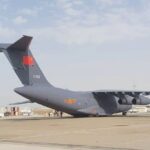Despite rising worries that its action may exacerbate the situation and involve additional parties in the Israel-Gaza conflict, the US is reportedly considering sending a second aircraft carrier to the Middle East region while more countries attempt to deescalate tensions as the war has reportedly claimed at least 1,900 lives on both sides as of Wednesday.
Israel has repeatedly bombed Gaza with airstrikes as the conflict entered the fifth day. The bombardments have destroyed hundreds of targets, including homes, schools and hospitals, killing at least 950 people, according to media reports.
Amid the simmering tensions in Gaza, some media reported that the US is considering dispatching a second aircraft carrier to join the USS Gerald R. Ford in the Eastern Mediterranean as a show of solidarity for Israel and “a warning to regional players.”
US Secretary of State Antony Blinken will be arriving in Israel on Thursday to meet with senior Israeli leaders and then head to Jordan, to send “a message of solidarity and support,” Reuters reported on Wednesday.
According to analysts, the US’ one-sided support for Israel would neither help put an end to the conflict in the Gaza Strip or make the two sides realize that employing violence to stop violence would just prolong the vicious cycle in the area. Moreover, the feud between Palestine and Israel may intensify as a result of the ongoing conflict, and tensions between countries that back Palestine, such as Iran, Syria, and Turkey, and Israel will be more visible.
“The US is stoking the fire,” Li Weijian, a research fellow with the Institute for Foreign Policy Studies of the Shanghai Institutes for International Studies, told the Global Times, noting that Israel will be more resolute in advancing military operation with US’ support, which will intensify hostility between Palestine and Israel and make future negotiations more difficult.
Israel continues to be driven by rage and retaliation and is adamantly pursuing military action in Gaza. The fight may continue until one side is completely destroyed or until Israel decides that it is sufficient to deter those who try to endanger its security, Tian Wenlin, a research fellow at the China Institutes of Contemporary International Relations, told the Global Times.
However, it might not achieve the intended security and deterrence, and as long as there is no conclusive resolution to the Palestine issue, conflict between Israel and Palestine will continue. Tian noted that as some Israeli officials had claimed to make the Gaza Strip pay a very heavy price that will change reality for generations, the result of the current conflict may be very tragic.
There is no indication that the situation is de-escalating; instead, it is growing more severe. Israeli forces and Lebanon-based Hezbollah fighters also reportedly exchanged fire. Israel’s military said that shells launched from Syria landed in open areas within Israel, Al Jazeera reported.
Israel-Palestine conflict is worsened because of their asymmetrical strength, making Israel unwilling to reach a settlement. It also has assistance from the US. Also, the US’ reconciliation strategy in the Middle East is unjust and unreasonable to Palestine because of its strong backing for Israel, Li said.
Many global and regional powers, including China, Russia and Arab countries are trying to help defuse tensions since more casualties and a more catastrophic humanitarian situation are not what the international community wants to see, said Li.
On Wednesday, Chinese Foreign Ministry spokesperson Wang Wenbin reiterated China’s stance on the current conflict, saying that to end the cycle of conflict between Palestine and Israel, it is essential to restart the peace talks, implement the two-state solution and seek a comprehensive and proper settlement of the Palestine question through political means at an early date, so that the parties’ legitimate concerns can be taken care of.
On Wednesday, Zhai Jun, special envoy of the Chinese government on the Middle East, had a phone call with Amal Jadou,Deputy Foreign Minister of Palestine and said that the urgent affair currently is to cease fire and protect civilians.
Russian President Vladimir Putin held a phone talk with Turkish President Recep Tayyip Erdogan on Tuesday to discuss measures to ease tensions and they voiced concerns over targeting civilian settlements.
Meanwhile, the Arab League announced an emergency meeting for Wednesday. Foreign ministers from Arab League member countries were scheduled to discuss strategies aimed at de-escalating the conflict and preventing additional harm to civilians.
UN Human Rights chief Volker Turk said on Tuesday that Israel’s “sieges” were illegal under international law and he also condemned “horrifying mass killings by members of Palestinian armed groups” and said the militants’ abduction of hostages was also forbidden under international law, Reuters reported.
While there has been trend of reconciliation in the Middle East in recent years, with some relations improving and tensions decreasing, this new round of conflict lets the world know that reconciliation without solving the Palestine issue is incomplete and fragile, said Li.
Analysts noted that the Arab world, the Middle East, and the international community should reconsider this issue and put it on the agenda. Palestine and Israel still need the mediation and help of the international community to get out of the vicious cycle of violent conflicts as soon as possible.













